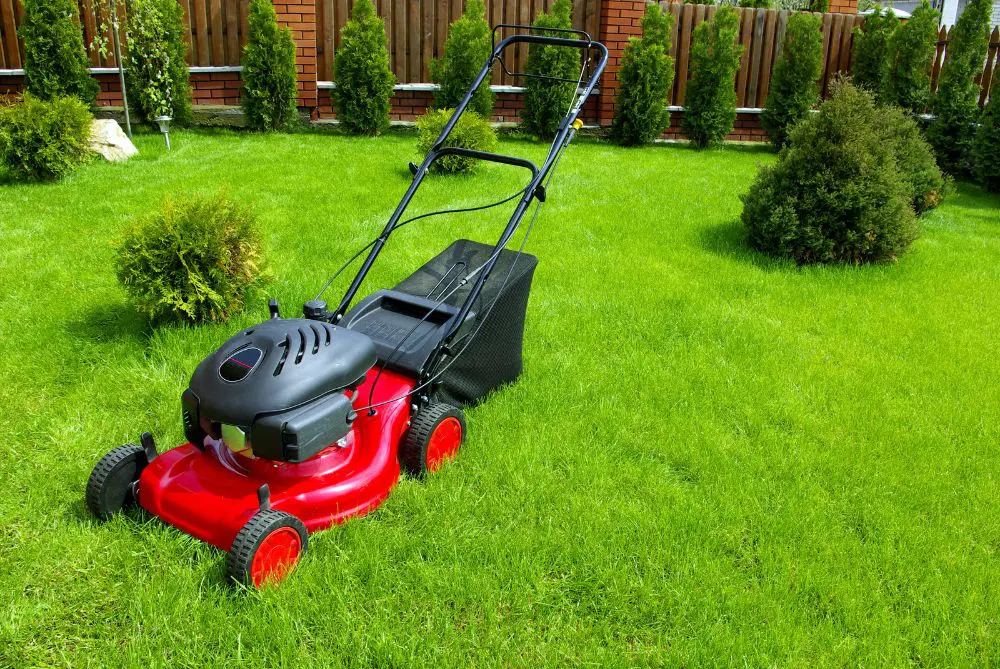If you’re debating whether or not to switch to a “greener” mowing routine, it’s important to compare the two cutting giants. Electric vs. gas lawn mowers isn’t a glamorous comparison, but we did it anyway and think that you’ll be impressed with our breakdown of the two.
Mowing Down the Competition
You know that old saying — nothing in life is certain except death and taxes? Well, you may as well add mowing the lawn to that list. It’s the never-ending chore that always springs back up.
For folks hoping to minimize their carbon footprint, leaving the ‘ol gas mower behind in favor of an electric model may be one of the best decisions you can make. Why? Studies show that gas lawn mowers pollute several times as much as your typical car. Yikes!
If you’re considering the switch (we hope so!), this article tells you what you need to know about the pros and cons of electric vs. gas lawn mowers. Think nothing compares to classic gas-powered lawn equipment? What you’re about to read just might surprise you.
Electric vs. Gas Lawn Mowers: Specifications to Consider
| Gas Mower | Electric Mower | |
|---|---|---|
| Run Time | ★★★ | ★★★★★ |
| Budget | ★★★ | ★★★ |
| Size of Lawn | ★★★★★ | ★★★ |
| Ease of Use | ★★ | ★★★★ |
| Eco-Friendliness | ★ | ★★★★★ |
Before we get into our in-depth comparison, let’s go over a few essential attributes shared between electric and gas mowers. We’ll be talking about all of these specifications in the next section.
1
Run time
The number one thing most people look for in a lawn mower is reliability. Nobody wants a lawn mower giving up mid-mow. Since gas lawn mowers and electric lawn mowers are powered differently, how does this affect their run time?
Corded electric lawn mowers can, in theory, run forever (unless there’s an electrical blackout, that is). That’s while gas mower runtime is limited to the mower’s fuel capacity. With gas mowers, you’ll also need to store flammable gasoline.
There’s also an ecological consideration here. As mentioned earlier, battery-powered lawn mowers are more sustainable than gas mowers, operating without fossil fuels. Still, batteries do require the mining of lithium from the earth, which is known to pollute water supplies in the mining operation area.
Corded electric lawn mowers really are your best choice to maximize both run time with minimal impact on the environment.
WINNER: Electric Lawn Mowers (Corded)
2
Budget
Even the most reliable lawn mower won’t do you much good if it’s out of your price range. But there’s more than the MSRP to consider, as there are many unexpected costs associated with gas vs. electric lawn mowers.
Some electric mowers cost more upfront, but gas mowers are more expensive in the long run, taking into consideration the expense of fuel, oil, and lubricants. With gas lawn mowers, you’ll also spend money on maintenance.
Although electric mowers are a little more expensive at the point of purchase, you will save money on gas, oil, lubricants, and maintenance. Battery-powered mowers do require new batteries periodically (an investment in both time and money), and corded electric lawn mowers do consume an additional 15 to 20 dollars annually in electricity — a pretty negligible expense.
WINNER: It’s a tie!
3
Size of Lawn
How do electric vs. gas lawn mowers measure up, depending on lawn size? Which kind of mower is best for small lawns, and which mower can handle larger lawns? This is particularly important, because nobody wants a mower that’s not up for the job at hand.

Do you have a large yard full of variable terrain? If so, a gas lawn mower is probably your best option, since gas lawn mowers tend to be more powerful and durable than their electric counterparts.
Many corded electric mowers can handle large lawns with power that’s competitive with many gas mowers. It’s essential to consider the power of the motor when shopping for both electric and gas mowers.
So how do you know if an electric mower is powerful enough to handle your lawn?
Experts say if your lawn exceeds 14,000 square feet, a gas mower is your best bet, while electric mowers can handle lawns of about 1,500 square feet. Don’t forget the cord can create issues reaching the back corners of larger lawns. If you live in a rainy area, stay away from electric mowers since they don’t handle wet grass as well as traditional gas mowers.
WINNER: Gas Lawn Mowers
4
Ease of Use
Maybe mowing the lawn isn’t your favorite thing to do, or maybe you have a physical challenge that makes it difficult to drag a heavy lawn mower all over your yard? Or perhaps you just want a lawn mower that starts when you need it to start, with minimal headache and maintenance?
Another important consideration when choosing a lawn mower is ease of use. Electric lawn mowers are lighter than their gas-powered counterparts. They’re also simple to start with the push of a button, and easier to maneuver in small lawns with flat terrain.
They also start a lot easier than gas mowers, launching with the push of a button as opposed to those difficult to use pull cords that start gas mowers. One ease of use issue with corded electric mowers, however, is the cord, most ranging from between 50 to 100 feet. Run over the cord, and you’ll be out money replacing the cable.
The cord issue is solved with battery-powered electric mowers, though there is some inconvenience (and expense) involved in buying and changing the battery when needed. Some can cost as much as 200 dollars!
WINNER: Electric Lawn Mowers
5
Eco-Friendliness
Is the solution as cut-and-dry as you think?
If you’re looking for an eco-friendly lawn mowing solution, electric mowers are your best choice. Gas mowers run on fossil fuels and require oil and other lubricants, as well as frequent maintenance.
Battery-powered electric mowers are also an eco-friendly choice. However, the batteries do require lithium, which is mined from the earth — thus making the corded electric mower the most eco-friendly option. Noise pollution is also a factor, as gas mowers are much noisier than electric mowers.
WINNER: Electric Lawn Mowers
Electric vs. Gas Lawn Mowers: An In-Depth Comparison
Here’s an in-depth look at how gas-powered lawn mowers measure up against their electric counterparts.
Gas Lawn Mowers

Gas lawn mowers are the tried-and-true models that’ve been around since the 1800s (though they didn’t reach widespread use until the early 1900s). A holdout from a bygone era, gas mowers are sturdy and robust, but also dirty and bad for the planet. Not to mention, difficult to push and obnoxiously loud.
That said, there are a few places where gas mowers excel in the electric vs. gas mowers debate.
The most prominent? Their ability to mow large lawns. To be sure, gas mowers are much more robust than electric mowers, and they can better handle tall, tough grass and wet landscapes (although if your lawn is more like a field, you should consider a riding lawn mower).
In addition, gas mowers come at a much wider range of price points than electric mowers. Low-end gas-powered models are much cheaper than entry-level electric mowers, regardless if they’re corded or battery powered. This often makes gas mowers the preferred choice for people who simply need a mower able to get the job done as cheaply as possible.
That said, gas mowers require a lot of maintenance to operate smoothly. These hidden costs, along with money spent on gas, oil, and other chemical lubricants, can really add up.
Oh, and those same chemicals? Yeah, they’re really bad for the environment and your yard. Not to mention all the noise pollution, which can be quite deafening.
In terms of ease of use, anyone who’s ever tried to start a gas mower with a pull-cord knows that even getting the dang thing started is easier said than done. That’s opposed to electric mowers, which spring into action with the simple push of a button.
Pros
- Cheap
- More powerful
- Better for large lawns
Cons
- Dirty
- Noisy
- Hard to start
Electric Lawn Mowers

Next up, we have electric lawn mowers. Electric mowers are a newer invention designed with an emphasis on efficiency and the environment. Powered by a cord or battery, they’re not as quick ‘n easy as gas mowers, but they do get the job done.
The biggest advantage to a corded electric lawn mower is that they run without fuel, making them a much cleaner and ecologically sustainable choice than a gas mower. They’re also powered by electricity, which provides the convenience of unlimited run time and hassle-free maintenance.
That said, corded models do come with drawbacks. Corded electric lawn mowers are limited in range of motion, due primarily to the fact you’re tethered to that power cord. Even if you have an extension cord long enough to reach the back forty, wrangling with the cable is hardly worth the hassle.
Fortunately, that’s not an issue with battery-powered electric motors. But even with these, you’ll still need a reliable hookup when charging. And then you’ve gotta be quick when mowing, else risk running out of juice.
And a negative for both corded and battery-powered electric mowers? They’re really only suited for small lawns and shouldn’t be used on wet grass.
Pros
- Unlimited run time
- Ecologically sustainable
- Limited maintenance required
Cons
- Not for wet grass
- Best for small lawns
- Limited range of motion (corded)
Verdict: Which Is Better?

While gas mowers are cheaper and more powerful than electric mowers, they’re dirty — burning fuel and oil — and require more money in the longterm thanks to tune-ups and maintenance. If you have a large lawn, though, you might be better off with a gas mower.
All that’s opposed to electric lawn mowers, which offer unlimited run time, and are a much more ecologically sustainable choice. With corded electric, however, you do have to contend with that power cord, which is a drawback, and electric lawn mowers are limited to small and mid-sized yards.
Whichever mower you choose, do your research carefully. Electric vs. gas mowers is a complicated argument. After making your investment, you’ll want your mower to run efficiently, be reliable, and suit your lawn care needs. Because let’s face it — we all just want our yard work done so we can get on with our day!
Further Reading






